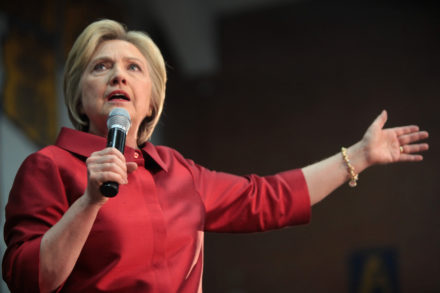
On a hot July day in Philadelphia, what seems like eons ago but was really just 2016, Hillary Rodham Clinton took to the stage at the Democratic National Convention to accept her party’s nomination to become the first female nominee of a major party in US history. Her victory felt almost certain.
Hillary was ahead in all but a handful of polls. Division within the party, which had plagued her over recent months, was beginning to ebb away as major rivals fell into line and began to be clear in their support of her as the nominee. Her opposition was fraught and confused. The future looked bright. Remind you of anything?
Then, just over three months later, the Democrats’ world came crashing down around them. As election night pressed on, it became increasingly clear that it wasn’t going to go Clinton’s way. As we in the Labour Party watched on, it was a sharp reminder of nights like this in our history – in 1992, 2010 and 2015…
How could Hillary Clinton go from President-presumed to disappointed challenger in a matter of weeks? And how can Labour make sure we don’t suffer the same fate?
1. Victory is never a done deal
Looking on at her opposition, it isn’t hard to understand why Hillary felt confident. A controversial, prejudiced man surrounded by a divided party of his own design would have been no match for the First Lady turned Senator turned Secretary of State in normal political circumstances. But 2016 was not a normal political year.
In Hillary’s situation, I see the Labour Party today. Consistently ahead in the polls, even if by a small margin. Our political opponents are confused and largely ineffectual. So how can we stop ourselves from suffering the same fate?
We must keep in mind that our victory, while it may feel closer than when we were 10 points behind in the polls back in 2016, is not a sure thing. As the saying goes, complacency is the enemy of success. If we allow ourselves to think that the next general election is over before it has begun, we run the risk of suffering the same kind of hubris that allowed Trump to snatch victory. We must renew our convictions to campaign for a Labour victory, to get out and fight for a win, or the next electoral defeat will be devastating.
2. It’s not just the votes we gain, it is where we gain them
Hillary Clinton’s results in New York, Rhode Island and the District of Columbia were great. As good as Obama’s – in fact her results in California were better. And yet the Republicans control the White House. Clinton fell foul of the truth that it doesn’t matter how well you do in your safe states, if you don’t win the swing states you can kiss inauguration goodbye.
A swelled liberal backlash against Trump meant that traditionally blue states were undeniably solid, but counting on a rust belt vote that no longer exists meant Michigan and Pennsylvania fell away in such a way as to deny Hillary her Presidency.
Labour has seen its vote in metropolitan areas of London, Bristol and Cardiff swell to incredible levels. This is exciting, but we must not forget the swing seats where we have lost out. Losing seats like Stoke-on-Trent South, Copeland and the Tees Valley mayoralty should be red flags for us – consolidation is important, but alone it won’t win us any elections.
3. The electoral system is not our friend
Clinton beat Trump. In the popular vote, that is. More than 2.5 million more people voted for Hillary than the Donald in 2016, and yet thanks to the American voting system coupled with the electoral college, Trump was handed the victory.
While Britain may not have an electoral college system, we do have first-past-the-post – a system that has historically been unkind to Labour. This could come to a head in the next election where analysis by Electoral Calculus suggests Labour could poll higher than the Tories, but end up with fewer seats.
Our poll lead will mean very little if we can’t turn around victories in individual seats. Early candidate selections and “Unseat” campaigns are the first steps for this. Putting aside national polling, our twisted electoral system means that flipping marginal seats as a result of a successful ground game is the only thing that will put Jeremy Corbyn in Number 10, and not leave him wondering “what happened?”.




More from LabourList
‘What Batley and Spen taught me about standing up to divisive politics’
‘Security in the 21st century means more than just defence’
‘Better the devil you know’: what Gorton and Denton voters say about by-election